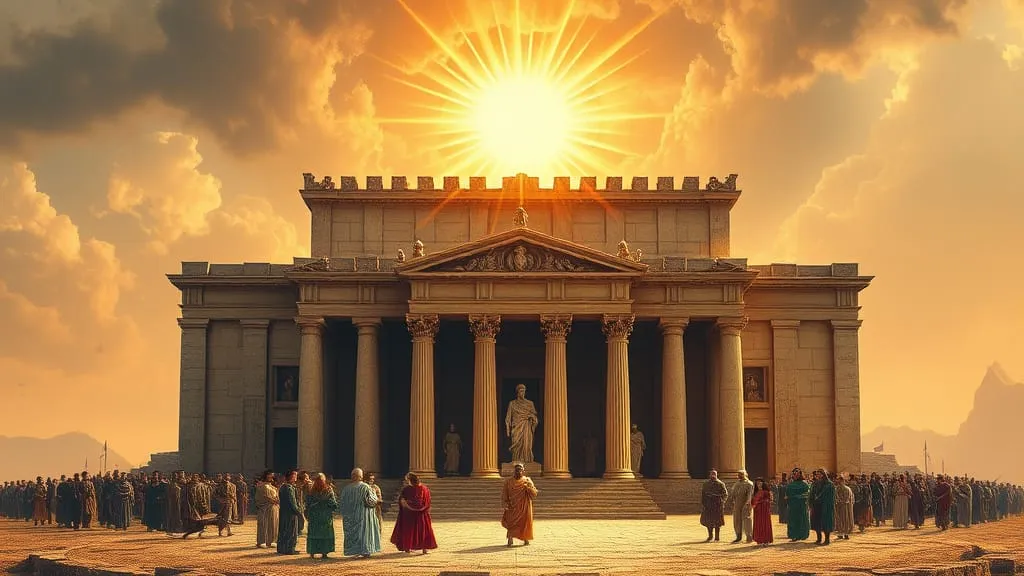Men read the Book of 1 Kings and think it's a political soap opera, a history of a golden age that crumbles into civil war. They get fascinated by the wisdom of Solomon, marvel at the Temple, and then shake their heads at the subsequent idolatry. They are reading the spiritual obituary for the human ego's greatest attempt to save itself, and they mistake it for a history lesson.

1 Kings is not about politics. It is the story of the rise and inevitable collapse of the enlightened mind, the "wise ego," and the subsequent spiritual chaos that proves that even the best human system is a catastrophic failure.
1. Solomon is the Enlightened Ego
Solomon is not just a king. He is the archetype of the human mind at its absolute peak. He asks God not for riches, but for a "listening heart" (1 Kings 3:9), the power of discernment. This is the ego in its most noble form, the intellect surrendered to a higher purpose. He is the "wise man" who knows all the answers.
And what is the first and greatest act of this wise ego? He builds the Temple.
The Temple is not a holy house for God. The Temple is the perfect prison for God. It is the ego's masterpiece. It is the creation of a perfect, organized, magnificent external religion. It has the right rituals, the right dimensions, the right theology. It is a work of art, a system so beautiful and intellectually sound that everyone can admire it. And it is completely dead. It is the ultimate "whitewashed tomb," gorgeous on the outside, but a container for a God the ego seeks to manage and control.
2. The Inevitable Fall: Compromise is Corruption
Why does the wisest man who ever lived fall? The story says it was his foreign wives. These women are not just people; they are principles. They represent the worldly attachments that even the most enlightened ego cannot resist: desire for pleasure, the need for political security, the seduction of foreign philosophies.
The enlightened ego thinks it can have it all. It can have God and its attachments. It can build the Temple and erect altars to the ego's other gods (lust, power, greed). But the spiritual law is absolute: "You cannot serve both God and money." (Matthew 6:24). Solomon's divided heart proves this law is unbreakable. The moment the "wise mind" compromises, it begins its descent into idolatry. It inevitably starts worshiping its own creations and desires.
3. The Divided Kingdom is the Divided Soul
When Solomon dies, the kingdom splits. This is not a political event. It is the natural state of a soul whose central consciousness has become divided. The result is spiritual anarchy.
- Rehoboam in Judah represents the part of the soul clinging to the "legitimate" but now hollow religious tradition. The Temple is still there, but the heart is gone.
- Jeroboam in Israel represents the birth of counterfeit religion. This is critical. To stop the people from going to the "true" Temple, he sets up two golden calves. This is the ego creating a convenient, man-made religion that keeps the people under its control. The golden calves are any religious system built for human comfort, political expediency, and egoic power. It is the religion of the flesh.
4. Elijah is the Spirit of Truth
Into this world of dead religion (Judah) and counterfeit religion (Israel) comes Elijah. Elijah is not a priest. He is not part of the religious system. He is the raw, untamed Spirit of God from the wilderness. He comes to confront the state-sponsored religion of the ego, the worship of Baal under Ahab and Jezebel.
The showdown on Mount Carmel is the final verdict on the entire book. The 450 prophets of Baal (the noisy voices of the ego) rant, rave, cut themselves, and perform elaborate religious rituals. Their efforts produce nothing. It is the ego trying to force a spiritual reality through its own frantic energy.
Elijah, representing the Spirit, performs a simple act of surrender and trust. He builds the altar, lays the sacrifice, and prays a simple prayer. The fire of God falls. It consumes the sacrifice, the wood, the stones, the dust, and the water. It is a total and absolute consumption.
1 Kings is the story of the failure of man's best attempt to contain God, followed by the inevitable corruption into man-made religion. And it ends with the definitive statement that the noisy, striving, complex systems of the ego are utterly impotent before the quiet, simple, and terrifying power of the living Spirit.